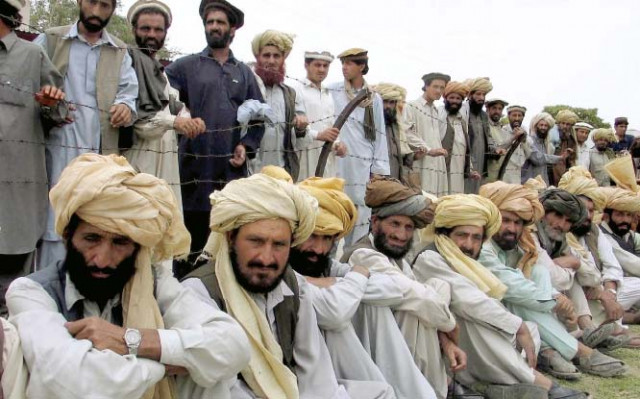Govt plans to absorb, bifurcate tribal areas
Govt devises comprehensive plan to restore peace after completion of military operations in tribal regions.

The plan includes proposals like administratively bifurcating the tribal areas into northern and southern parts, gradually converting them into protected areas, creating a garrison in every tribal agency headquarters, maintenance of over a century-old Frontier Crimes Regulations (FCR) with some amendments, setting up of Azad Fata Appellate Tribunal, extending of the Political Parties Act to Fata, confining Frontier Corps to just border security and establishing a new Fata Levies Force to replace it and placing selected frontier regions under the control of an additional commissioner.
The plan was prepared after consultation with the governor of Khyber-Pakhtunkhwa and other relevant institutions.
Another proposal calls for granting tribal areas the status of a province, instead of absorbing them into Khyber-Pakhtunkhwa.
The plan, which aims to establish law and order and promote economic and social activities, suggests that every tribal agency should gradually be transformed into a protected area, resulting in improved control of the political administration. Political agents will be tasked to seek the opinion of local tribes. Such protected areas have already been set up in Ghalnai Bazar and Mian Mandi areas of the Mohmand Agency.
The plan calls for amending FCR in line with the suggestions of Justice Ajmal Mian’s Report. This will reduce the rate of arrests under the common responsibility clause, reform the bail system and establish an Azad Fata Tribunal, enabling tribesmen to file appeals.
The Political Parties Act will be extended to Fata so that tribal and religious issues could be controlled. It will also facilitate the emergence of new leadership in Fata.
The plan also envisages amalgamation of selected Frontier Regions, gradually bringing them under the control of an additional commissioner so that the unit could be annexed gradually into a settled district. Of the protected areas from Malakand, Sakhakot tehsil will be absorbed in Mardan and Ranizai into Lower Dir districts.
The government has suggested setting up of civic centres at the tribal agency headquarter level where housing facilities on the order of townships can be provided. These townships should have schools, hospitals, colleges, parks and shopping centres as this arrangement will be able to convince doctors and teachers to serve in tribal areas.
The plan calls for setting up cantonments in tribal areas, with 25 to 30 kilometres left around them for agricultural activities.
It also calls for limiting the role of Frontier Corps to checking militancy in tribal areas and securing the border between Pakistan and Afghanistan and creation of a new Levy Force for replacing the FC.
The new force should take up the responsibility of policing under the control of political agents. The Khasadar force should be turned into community police.
Trade gateways will be set up in all tribal agencies on the pattern of Torkham in the Khyber Agency, providing communications, customs and immigration facilities to boost economic activities.
Land settlements in Fata will be created and small dams constructed. Traditional systems of maliks will be promoted so that the state could get their support in maintaining law and order.
Tribal customs like nanawatay and the neighbourhood system will be implemented but application of local customs will be restricted to tribesmen and not applied to foreigners, criminals, anti-state people and people living in settled areas.
Published in The Express Tribune, November 23rd, 2010.



1725254039-0/Untitled-design-(24)1725254039-0-208x130.webp)















COMMENTS
Comments are moderated and generally will be posted if they are on-topic and not abusive.
For more information, please see our Comments FAQ